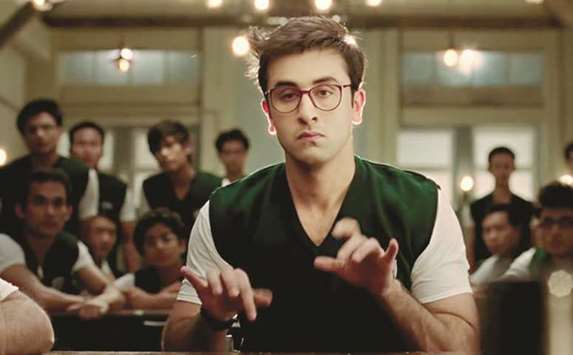A bane of Indian cinema has been its inability or lethargy to think fresh, to think novel. But often, not always, what it does is to lift ideas, sometimes whole frames and stories (It Happened One Night/Dil Hai Ki Mante Nahin), from foreign fare, and present them to a gullible audience. What is even more regrettable is that these “copies” are not first class; they are at best mediocre.
Anurag Basu’s Jagga Jasoos falls into this pothole. As the first images of the just-opened film flitted by, I knew where the idea had come from. Why from the celebrated (also for the wrong reason, when he changed his faith) Serbian auteur, Emir Kusturica, whose splendid celluloid extravaganza has been nothing short of magical. Oh, yes, he creates fantasy with a colour palette that is bright and beautiful – with yellows and greens and reds and blues swishing wildly, as wildly as the ocean waves on a stormy night. His characters – as I have seen in Underground, in Black Cat White Cat, Life is a Miracle and Promise Me This among others – are restless, his settings exuberant, his ideas passionate. But his plots are extremely focussed, and his scripts steadfastly move from point to point – never, for a moment, distracted from the kind of Mad Hatter’s Party unfolding on the screen. Well, a director needs to be nothing short of brilliant to have this kind of control over his movie.
Basu, may be well meaning, but meandering to the point of allowing his film to wander off into the vaguest of alleyways. And he finds it difficult to return to where he let his story go off.
Jagga Jasoos is at its very core a personal narrative of a son, Jagga’s (Ranbir Kapoor), search for his foster father (played by Saswata Chatterjee) that takes the boy places – Kolkata, Manipur and finally Mobaka (hope I got this name right) in Africa. There in the final sequences we are taken on a raucous roller-coaster ride (there is one earlier on a giant wheel with a giddy Katrina Kaif as Shruti Sengupta screaming in fright), with exotic animals, likes giraffes, zebras, emus and even a cheetah, a circus train and a chief villain (an Indian intelligence officer essayed by Saurabh Shukla).
And why did the father abandon his boy in a boarding school? The man had witnessed the 1995 Purulia (West Bengal) arms drop and had got involved in it, an involvement which pushes him from place to place in search of notorious arms dealers – whose sole aim is to provoke war. While the father is away, Jagga – grows up looking like Tin Tin, replete with the little tuft on his head, and like the intrepid boy reporter, is bitten by a desire to detect all things evil. This includes an extra-marital affair which results in murder, the man’s mistress being pushed off a tall clock tower (a la Hitchcock’s Vertigo), and another killing on a giant-wheel. Jagga just with the flick of a run or a hop or a skip solves these mysteries – but through a script that is musical, via conversations which are sung. Very Hollywood, very Western in style, but the story is Bollywood.
Basu takes the melodious route to perhaps heighten his protagonist’s handicap. Jagga is a terrible stammerer, and he finds a simple solution to get over it. His father teaches him early on to sing song his words. He does, and the movie turns into a canvas of music and mirth and merriment. And aiding and abetting in the novice sleuth’s sojourns is Shruti, a news reporter, older to him, but clumsy as Hell – a trait which helps our Tin Tin look alike to zero in on his runaway father. There is a scene where the older man keeps running away from him in Africa till a desperate Jagga failing to get his words out, points to his little tuft on his head. The father recognises him – and what could have been a simple, straightforward story of a boy pining for his pop slips and slithers into pit after pit. Which really takes away the charm of the plot, with a distraction too many diluting the narration.
Admittedly, there is lovely camerawork by Ravi Varman that captures the myriad moods and madness. There is also some good music by Pritam, and Kapoor (imitating his grandfather, Raj Kapoor) is a fine performer. But then his role is a mere extension of the deaf-mute character he portrayed in Barfi, and Chatterjee is superb, a real arc-like change from the cold-blooded, gun-totting rogue in Kahani. But the less said about Kaif, the better. She is still too wooden for her own good – a miscast in a work that is uniformly high in acting.
A final observation. Did Basu want Jagga Jasoos to be another My Fair Lady or Mary Poppins or even another The Sound of Music? Maybe he did, but he fails to go anywhere near the excellence of these classics. JJ is an experiment, well intentioned but poorly executed. A needlessly complicated canvas spoils what could have been a good film.
*Gautaman Bhaskaran has been
writing on Indian and world cinema
for close to four decades, and may be e-mailed at [email protected]

There is lovely camerawork by Ravi Varman that captures the myriad moods and madness. There is also some good music by Pritam, and Ranbir Kapoor (imitating his grandfather, Raj Kapoor) is a fine performer.
